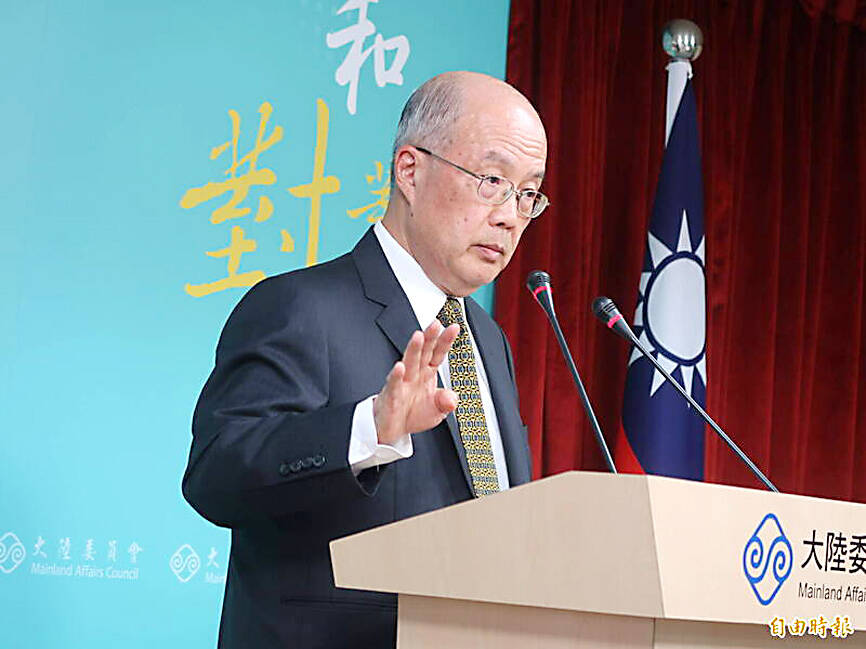The Chinese Ministry of Culture and Tourism yesterday announced its third batch of countries that Chinese tour groups can visit — with Taiwan conspicuously left out of the list.
Mainland Affairs Council Deputy Minister Jan Jyh-horng (詹志宏) said that the government has conveyed through various communication channels Taiwan’s sincerity and goodwill in promoting tourism, but so far there has been no positive response on China’s part.
China’s latest list covers 78 countries, including Japan, South Korea, the UK and the US.

Photo: Chung Li-hua, Taipei Times
As China reopened to the world, it announced its first list of target destinations for tour groups on Feb. 6 and its second list on March 10, which covered 60 countries.
China’s Taiwan Affairs Office on May 19 announced that Chinese travel agencies can host tour groups arriving from Taiwan, saying that the matter does not require cross-strait negotiations.
Taiwan, on the other hand, allows individuals to travel to China, but bans travel agencies from organizing group tours to China.
Minister of Transportation and Communications Wang Kwo-tsai (王國材) last month reiterated that both Taiwan and China must mutually show goodwill before normal cross-strait tourism could resume.
“We do not ban individuals from traveling to China, but China prohibits its own people from traveling to Taiwan individually or through package tours. They hope tour groups from Taiwan can come visit, and likewise we hope Chinese tour groups can come,” Wang told reporters.
Taiwan’s exclusion from the list is the result of deteriorating cross-strait relations and a lack of mutual trust, a Taiwanese tour operator told the Taipei Times on condition of anonymity.
While Beijing might have factored the upcoming presidential election into its consideration when it excluded Taiwan from the list, the operator said that both sides need to quickly resume negotiations through the Taiwan Strait Tourism Association and the Association for Tourism Exchange across the Taiwan Strait, which represent Taiwan and China respectively.
Both sides have already missed two great opportunities to break the ice and communicate with one another, the operator said.
For the Cross-Strait Summer Travel Fair in Taipei last month, which was held in conjunction with the Taipei International Summer Travel Expo, China was planning to send a delegation comprising officials and tourism operators from nine Chinese provinces.
Of the 212 members who were planning to attend, the Mainland Affairs Council only gave entry permits to 137 Chinese tour operators, staff members and entertainers participating in the travel fair, and denied entry to all Chinese officials, the operator said.
While travel agencies from China and Taiwan last week met in Hefei City in China’s Anhui Province for a conference, no representative from the Taiwanese government participated, the operator said.

DAREDEVIL: Honnold said it had always been a dream of his to climb Taipei 101, while a Netflix producer said the skyscraper was ‘a real icon of this country’ US climber Alex Honnold yesterday took on Taiwan’s tallest building, becoming the first person to scale Taipei 101 without a rope, harness or safety net. Hundreds of spectators gathered at the base of the 101-story skyscraper to watch Honnold, 40, embark on his daredevil feat, which was also broadcast live on Netflix. Dressed in a red T-shirt and yellow custom-made climbing shoes, Honnold swiftly moved up the southeast face of the glass and steel building. At one point, he stepped onto a platform midway up to wave down at fans and onlookers who were taking photos. People watching from inside

A Vietnamese migrant worker yesterday won NT$12 million (US$379,627) on a Lunar New Year scratch card in Kaohsiung as part of Taiwan Lottery Co’s (台灣彩券) “NT$12 Million Grand Fortune” (1200萬大吉利) game. The man was the first top-prize winner of the new game launched on Jan. 6 to mark the Lunar New Year. Three Vietnamese migrant workers visited a Taiwan Lottery shop on Xinyue Street in Kaohsiung’s Gangshan District (崗山), a store representative said. The player bought multiple tickets and, after winning nothing, held the final lottery ticket in one hand and rubbed the store’s statue of the Maitreya Buddha’s belly with the other,

‘COMMITTED TO DETERRENCE’: Washington would stand by its allies, but it can only help as much as countries help themselves, Raymond Greene said The US is committed to deterrence in the first island chain, but it should not bear the burden alone, as “freedom is not free,” American Institute in Taiwan Director Raymond Greene said in a speech at the Institute for National Defense and Security Research’s “Strengthening Resilience: Defense as the Engine of Development” seminar in Taipei yesterday. In the speech, titled “Investing Together and a Secure and Prosperous Future,” Greene highlighted the contributions of US President Donald Trump’s administration to Taiwan’s defense efforts, including the establishment of supply chains for drones and autonomous systems, offers of security assistance and the expansion of

STREAMLINED: The dedicated funding would allow the US to transfer equipment to Taiwan when needed and order upgraded replacements for stockpiles, a source said The US House of Representatives on Thursday passed a defense appropriations bill totaling US$838.7 billion, of which US$1 billion is to be allocated to reinforcing security cooperation with Taiwan and US$150 million to replace defense articles provided to the nation. These are part of the Consolidated Appropriation Act, which the US House yesterday passed with 341 votes in favor and 88 against. The act must be passed by the US Senate before Friday next week to avoid another government shutdown. The US House Committee on Appropriations on Monday unveiled the act, saying that it allocates US$1 billion for the Taiwan Security Cooperation Initiative